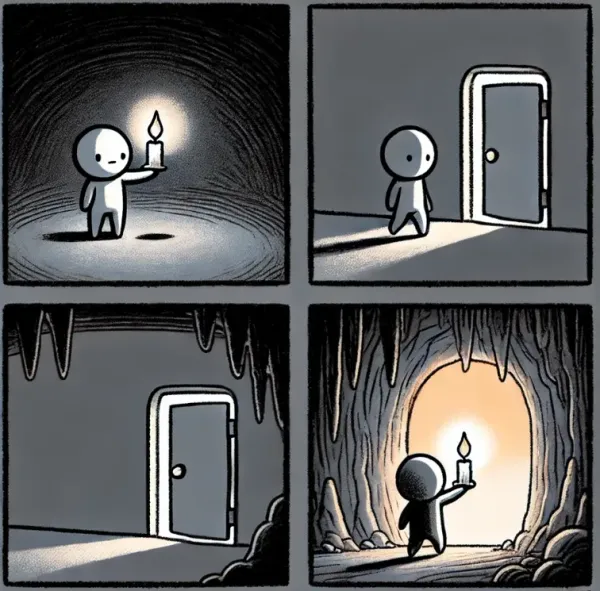Looking Over The Edge
The infinite value of exploring challenging ideas
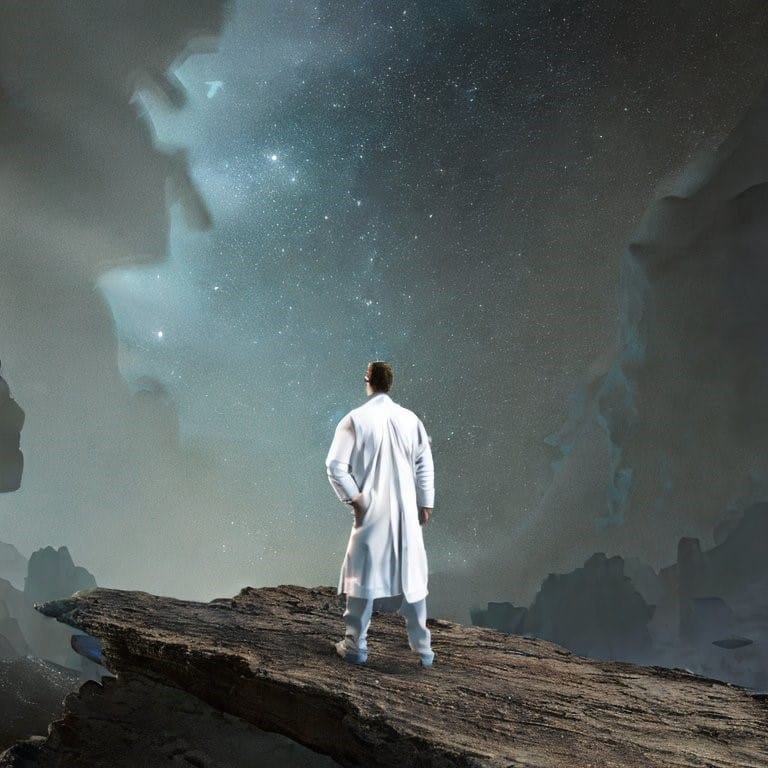
[14 minute read]
How open-minded are you?
Let’s conduct an experiment…
Keep an Open Mind
Back in March I gave an interview to my friend Jules Evans. It was different to any interview I’ve given before. It was personal, not professional. Jules is a philosopher and his area of focus is the difficulties of integrating psychedelic or spiritual experiences. I was much more candid than I’d ever been before on the specifics of my crisis several years ago.
One of my evolving beliefs is that the more open you are to the world, the more open the world is with you. I adore the phrase “love is mutually accelerating disclosure.”
Psychologist Arthur Aron had two people sit face to face and answer a series of thirty six increasingly personal questions. Then they stared silently into each other’s eyes for four minutes. The effect was so powerful that two of the participants even got married shortly afterwards.
I believe this dynamic applies to the whole of reality: the more open you make yourself, the more you’ll receive in return. It’s why open-mindedness correlates so closely with wisdom and general human flourishing.
But the reverse is also true. If all information is energy, excessively closed-minded people literally receive less vitality from the world. I regularly think of a passage from John Arden’s book Mind-Brain-Gene:
"Complex adaptive systems are by nature open systems. We need interaction with the environment to grow and change. Closed systems, by contrast, are isolated, with no exchange of information with the environment. They are forced to feed on themselves." [Emphasis added].
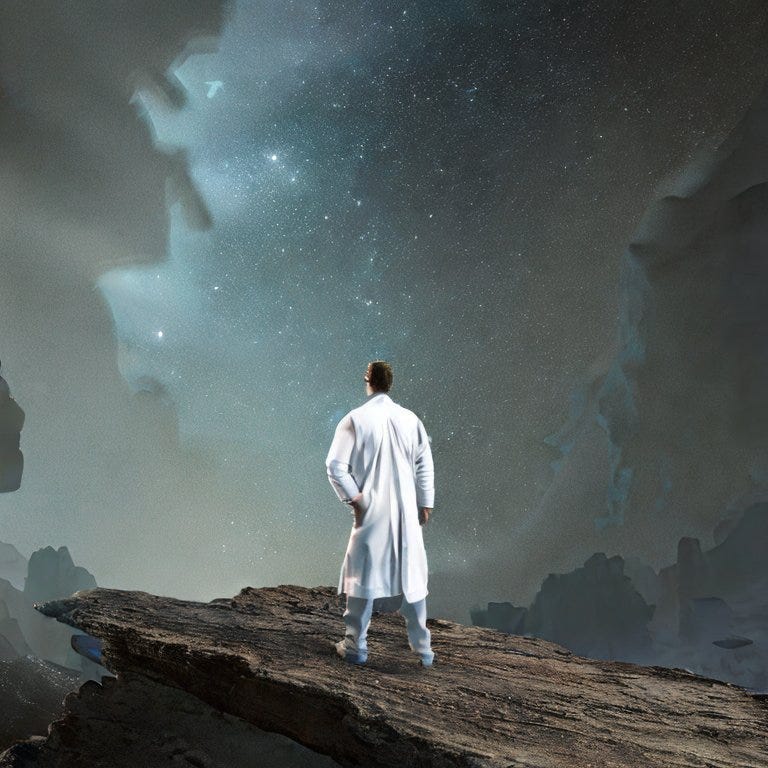
Mind. Blown.
In the last few months I’ve been confronted with a new perspective on reality that has challenged what I thought was my relatively open mind. Since then I’ve tried to be receptive to confirmation that this wasn’t total insanity. In the meantime I even wrote a piece specifically on the importance of open-mindedness in investing...
… And then immediately after the interview with Jules, I was contacted by neuroscientist Dr. Mona Sobhani. She’d listened to my story and we found we’d taken similar paths. As a devoted rationalist scientist, a personal crisis forced her to reexamine her prior beliefs. Last summer she published her findings in a remarkable book, Proof of Spiritual Phenomena.
For the last several years I’ve been writing about an unfolding reunion between science and spirituality. But this book threatened my worldview so radically that I sometimes felt physically queasy when reading it.
Using her background as an academic, Dr. Sobhani dove into the research around “psi phenomena” and was utterly shocked at what she found. Psi research describes interactions between individuals and their environment that seem to transcend the ordinary constraints of spacetime. This would include pre-cognition, telepathy, remote viewing and clairvoyance. Up until literally the last few weeks, if anyone told me they’d been to a psychic I’d respond with a patronizing explanation of cold-reading and other common tricks used by charlatans. I think this is a common reaction. My highly scientific poll of 255 of my Twitter followers had the results I would have anticipated:
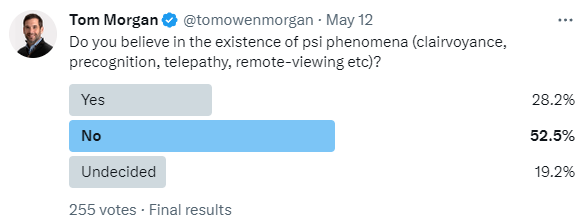
My default, but entirely unexamined, view was that these psi phenomena must have been studied and quickly debunked. The reality appears to be close to the opposite: there is an ocean of published research, and from credible sources. As Mona writes:
As a quick summary, psi research has been conducted for over a century, by hundreds of scientists, from multiple labs across the entire world, in hundreds of thousands of participants and in many prestigious institutions, such as Princeton, Cornell, Duke, UC Berkeley, and UCLA.
As it’s often labeled “pseudoscience” or “woo”, the psi study designs are frequently more rigorous than in typical social science research. Even wilder, Mona discovered the amount of evidence in support of psi is meaningfully higher than some other common findings in neuroscience and psychology.
The evidence for the reality of psi is on par with that for other established psychological phenomena, although there is no current understanding of the mechanisms behind the phenomena. I know that almost no mainstream scientist will read those sentences and believe it- or if they’re trained well, they won’t- so I invite them to do the reading themselves, like many others have…
… In fact, the effect sizes of some psi protocols are much larger than those for the clinically recommended uses of some common medications, such as aspirin for the prevention of heart disease (0.12), metformin for type 2 diabetes (0.03), statins for cholesterol lowering (0.15), antidepressants for depression (0.38), and angiotensin-converting enzyme inhibitors for hypertension (0.16) (Leucht et al. 2015) and would be classified as “evidence-based” applying the criteria of clinical practice (Haidich 2010).
One of the strangest findings was a meta analysis of 90 experiments from 33 labs that suggested content from the future can influence behaviour in the present. One experiment allegedly found studying for a test AFTER the test improved performance on the test already taken. That one fried my brain for a while.
After hundreds of hours of research, Mona concluded with a compelling, if fundamentally unsettling, argument:
Consider the following: You can dismiss and justify an accurate intuitive reading as lucky guesses or argue that past life regression is the patient making up a fictional story that inexplicably becomes therapeutic or classify all the hundreds of researchers that find evidence of clairvoyance, precognition, and telepathy as frauds or believe that NDEs are residual brain activity (even though that goes against the evidence) or insist that the thousands of cases of children describing past lives with verifiable details are due to pure coincidence or explain away spiritual and mystical experiences as simply neural activity with no meaning, but… all of them?
How does that paragraph make you feel?
Is that reaction based on your rigorous understanding of scientific consensus, your lived experience or cultural pressure?
If your appeal is to scientific consensus, and you haven’t read the research yourself, Mona’s book is challenging. If it’s inconsistent with your lived experience, that makes perfect sense. I didn’t even start to ask questions until I’d personally experienced psi anomalies that I couldn’t explain using my existing worldview. So it’s hard for me to expect this to be all that persuasive.
But the point of this piece certainly isn’t to try to convince you of the existence of psi phenomena. Even now, I generally lean towards skepticism. Instead it’s about how to think about ideas that fundamentally threaten our culture’s prevailing worldview.
I believe the REACTION to these kinds of studies is just as interesting as the findings themselves.
Closed Minds Stop Growing
It seems to be a constant throughout history: In every period, people believed things that were just ridiculous, and believed them so strongly that you would have gotten in terrible trouble for saying otherwise.
Is our time any different? To anyone who has read any amount of history, the answer is almost certainly no. It would be a remarkable coincidence if ours were the first era to get everything just right.
-Paul Graham
Any serious student of history knows that that science and spirituality haven’t always been this far apart. Indeed, twenty two Nobel Prize winners and leading scientists have personally reported such anomalous experiences and taken positions in favor of their existence.1
What seems to be happening is that we are getting more closed-minded as time goes on. Discussing these topics elicits an unusual fear of mockery or a loss of credibility. Nobody wants to sound gullible, and being too open comes with its own dangers. It’s interesting that nobody seems to raise an eyebrow if you talk about the spookier aspects of quantum physics, even though they continue to defy our current understanding of space-time. It’s only if you apply these dynamics to our own psyches, to consciousness itself, when the eyes start to roll. I’ve noticed it’s a topic that even makes some people angry. This reminds me of the fact that anger is the most lateralized of our emotions: in our brain’s defensive, competitive, rational but ultimately limited left hemisphere.
You can often spot the exact places other people have stopped learning, and it’s usually the point that defensively triggers their ego or professional identity. As Upton Sinclair memorably remarked: “it’s difficult to get a man to understand something, when his salary depends on his not understanding it.” This applies in every domain, from stock markets, to business to science. But I had also failed to appreciate the degree to which it currently applied to me.
There’s one specific point beyond which many people simply can’t go. Making this “flip” involves entertaining the idea that there is an intelligence to our environment that we can enter into relationship with.
Over The Edge
This defensiveness might be for good reason. The transition away from the egocentric worldview can often precipitate a “dark night of the soul”. As it did for me. Jungian analyst Robert Johnson wrote:
It is an extremely dark time of great suffering, as it involves the giving over of one’s life to a higher center of intelligence than the ego can provide. This precedes the flowering of creativity in anyone who has the capacity for genius.
The psychologist Helene Shulman wrote a fascinating book called Living at the Edge of Chaos. She explores the linkage between chaos theory and the evolution of consciousness across cultures. There’s one passage that has stuck with me for many years:
It seems that there is a “threshold” in the human psyche, well protected by the high grid of ego structure, that may be crossed under certain circumstances. This threshold is an “inner” or phenomenological experience that complexity theory models as the edge of chaos. It is “real” and “objective” in the same way as other more commonly experienced emotional states, like hunger or fear. This threshold experience has been reported by psychotics, mystics, healers, shamans, ethnologists, philosophers, and even some psychiatrists and cognitive psychologists, all over the world. Yet, we have lacked the courage to integrate it in scientific or medical theory in the West. It is as if we suffer an unconscious defensive contraction in our intellectual schemata at the edge of chaos as well.
The ego protects itself from dissolution. Which makes sense!
Evolutionary psychologist Brett Andersen has written some great essays on phase changes and he illustrates this universal pattern with a simple diagram. If your worldview is incomplete, it creates an increasingly uncomfortable feeling of dissonance. Something’s not quite right. This then builds to a phase change when the whole system descends into chaos. If the individual makes it through, they emerge with a new, more complete frame. These phase changes can often be caused by encountering an “anomaly” that significantly challenges your current perception of reality.
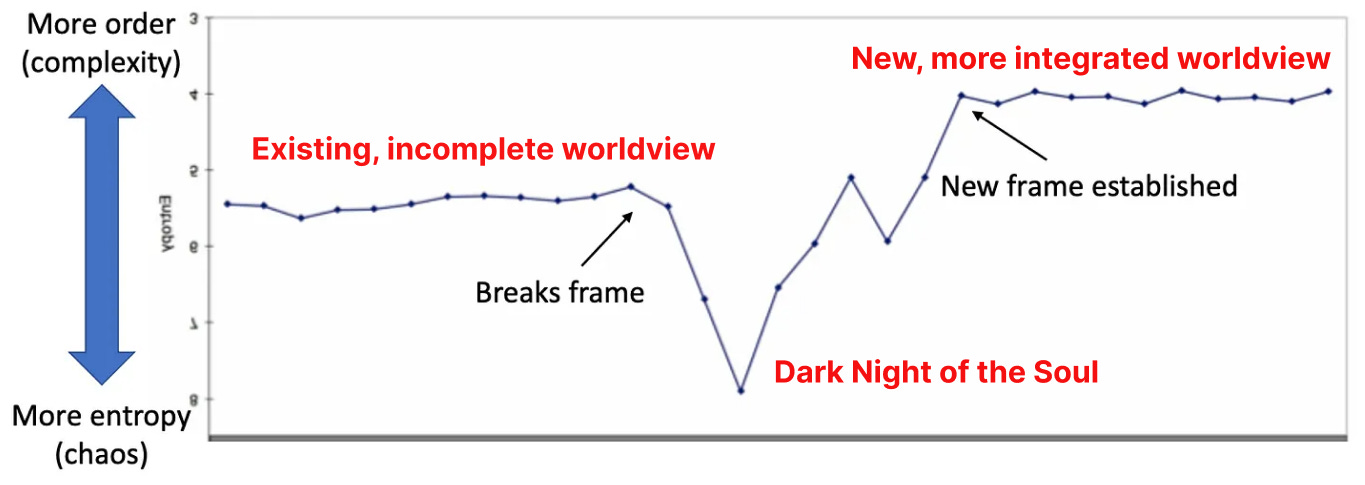
The broader relevance of this idea is that a new worldview is unfolding that requires science to be a foundational part. Our culture’s current limitation is an excessively zero-sum approach to the world. This is related to what Shulman calls the “high grid” of the Western ego. The fact that exploring psi topics comes with so much social stigma further confirms this may be a cultural constraint, and one that’s actually relatively unique to our time and place. It’s difficult to get a society to understand something, when its reality depends on not understanding it.
In order to evolve our own consciousness, we need to be open to more possibilities about the nature of consciousness itself.
But the thing about consciousness is that it’s often a surprisingly boring and confusing topic. I can’t remember the difference between panpsychism, panentheism, or cosmopsychism. All I care about is what it means about how to act in my life.
Thankfully Mona came to a similar conclusion I have. That it’s all about becoming more loving and open to the world. This sounds fluffy, but it’s actually quite practical.2 Since my own flip, the gifts have been abundant. I finally feel more at home in the world, creative and joyful.
The direct relevance to this piece is rather elegant. I had recently become a little stale in my own thinking. Then I gave an unusually vulnerable interview about the anomalous experiences that had caused my own world to come apart. My motivation was simply to offer some comfort to others going through their own dark nights. In being open, and threatening my professional persona, I was then presented with an entirely unexpected and deeply challenging new avenue for my own curiosity. I’m now taking another risk by sharing it publicly. We’ll see how that goes…
Can being habitually open-minded prevent a dark night experience? I don’t know, but I’m staying open-minded.
If you’re in the dark night, hold on. Otherwise keep your mind and heart open. You never know what you’ll be shown next.
"In times of change, learners inherit the earth, while the learned find themselves beautifully equipped to deal with a world that no longer exists."
- Eric Hoffer
Related Reading/Listening.
- Article/Podcast/Video: A Dark Night on Wall Street (29 minute read/1hr 18 minute listen). My interview with Jules Evans. I’m obviously somewhat reluctant to share this, as you’ll soon understand. But it seems like the right thing to do in this context.
Article: Rational Magic: Why a Silicon Valley culture that was once obsessed with reason is going woo by Tara Isabella Burton (40 minute read). A kind reader sent me this superb essay just yesterday (thanks Ed!). The shift in perceptions of consciousness discussed above already seems to be underway in Silicon Valley.
"We’ve run up against the limits — political, cultural, and social alike — of our civilizational progression; and something newer, weirder, maybe even a little more exciting, has to take its place."
Article: Great Investors See Things Differently by Frederik Gieschen (13 minute read). Frederik expands on topics raised in my earlier exploration of open-mindedness in investing, specifically around the consistently fantastic work of Cedric Chin.
“Cedric’s emphasis on case studies resonated with me because we can frequently observe investors stitch together analogies in their analysis of a complex situation. Where the amateur observes the noise of a river, the pro has developed a sensitivity to nuance and finds a hidden current in the stream. Lockwood turns this perception into art, great investors use it to generate outsize returns.”
Article: What You Can’t Say by Paul Graham (40 minute read). This 2004 essay has long been a favourite of mine. It helped me grasp the fact that the societal consensus on what ideas are acceptable is both pretty arbitrary and socially constraining.
“Let's start with a test: Do you have any opinions that you would be reluctant to express in front of a group of your peers? If the answer is no, you might want to stop and think about that. If everything you believe is something you're supposed to believe, could that possibly be a coincidence? Odds are it isn't. Odds are you just think what you're told.”
Markets & Investing Reading
Article: Interview: Dan Wang, China specialist. Sapient firm favourite Dan Wang gave a typically superb interview to Noah Smith on all things China (39 minute read). I wrote a short piece last week on the bizarre global tension where we’re not producing enough commodities to meet global capex and infrastructure needs (5 minute read). This is something Dan also discusses:
“There's something quite strange about the US where it is able to make super-advanced products like AI, jet engines, semiconductor production equipment, but can't build basic infrastructure or simple products.”
Article: The Value of Nothing by Julius Krein (60 minute read). This is a long but powerful essay on the strained relationship between the physical and virtual worlds in markets and the economy (something I’ve also explored). The author takes a pretty scathing view of the pursuit of financial returns over real-world growth.
“A more comprehensive explanation would simply state that the U.S. economy is, to a unique extent, organized around maximizing asset values and returns on capital independently of growth—in terms of corporate behavior, financial market incentives, and government and central bank policy.”
Thanks for reading What's Important?! Subscribe for free to receive new posts and support my work.
Jeffrey Kripal’s short book “The Flip” is an account of scientists and their plentiful encounters with “inexplicable phenomena.” ↩
Here’s my best effort to articulate why “follow your bliss” is actually a workable life-path. ↩
The information provided is for educational and informational purposes only and does not constitute investment advice and it should not be relied on as such. It should not be considered a solicitation to buy or an offer to sell a security. It does not take into account any investor’s particular investment objectives, strategies, tax status or investment horizon. You should consult your attorney or tax advisor.The views expressed in this commentary are subject to change based on market and other conditions. These documents may contain certain statements that may be deemed forward looking statements. Please note that any such statements are not guarantees of any future performance and actual results or developments may differ materially from those projected. Any projections, market outlooks, or estimates are based upon certain assumptions and should not be construed as indicative of actual events that will occur.




